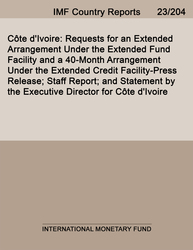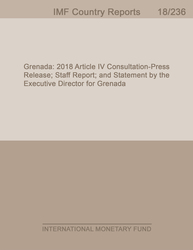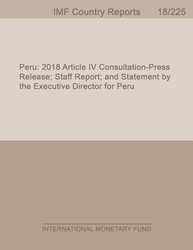
Côte d'Ivoire: Requests for an Extended Arrangement Under the Extended Fund Facility and a 40-Month Arrangement Under the Extended Credit Facility-Press Release; Staff Report; and Statement by the Executive Director for Côte d'Ivoire
Côte d'Ivoire: Requests for an Extended Arrangement Under the Extended Fund Facility and a 40-Month Arrangement Under the Extended Credit Facility-Press Release; Staff Report; and Statement by the Executive Director for Côte d'Ivoire
READ MORE...
Volume/Issue:
Volume 2023
Issue 204
Publication date: June 2023
ISBN: 9798400245596
$20.00
Add to Cart by clicking price of the language and format you'd like to purchase
Available Languages and Formats
| English | |||
| French |
Prices in red indicate formats that are not yet available but are forthcoming.
Topics covered in this book
This title contains information about the following subjects.
Click on a subject if you would like to see other titles with the same subjects.
Exports and Imports , Inflation , Economics- Macroeconomics , Money and Monetary Policy , Public Finance , Development - Economic Development , International - Economics , financing support , revenue mobilization strategy , debt ratio , Côte d'Ivoire vision , Ivoirian authorities , Debt sustainability , Government debt management , Global , West Africa
Also of interest
Summary
This paper presents Côte d'Ivoire’s request for an Extended Arrangement Under the Extended Fund Facility (EFF) and a 40-Month Arrangement Under the Extended Credit Facility (ECF). IMF Board approves 40-month arrangements under the EFF and ECF for Côte d’Ivoire to help support the country’s transformation toward upper-middle income status through the implementation of the authorities’ national development plan while preserving macroeconomic stability. The key reform agenda under the arrangements is domestic revenue mobilization, which is central in preserving fiscal and debt sustainability and along with increased spending efficiency should generate fiscal space to help finance investment needs and critical spending in health and education to allow for deeper economic transformation. Structural reforms should further deliver improvements in business climate, private sector investments and financial inclusion to foster the necessary conditions for inclusive growth, through strengthening governance and human capital investments, especially amongst youth and women.
Copyright © 2010 - 2026
Powered by:
AIDC



